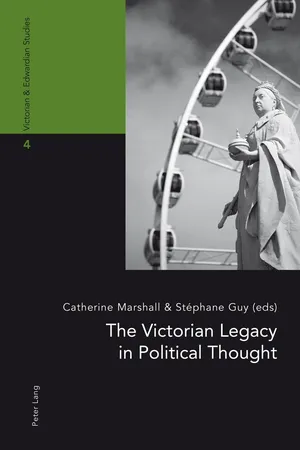About this book
The Victorian era was one that teemed with multitudinous and sometimes opposing visions of polity yet rarely questioned the very existence of the State. What might be called the pragmatism of the elite gave rise to a form of democratic compromise, allowing the growth of political ideas that may still be found in contemporary political thought.
Have reformist, socialist, liberal or utilitarian ideas avoided the dogmatism of twentieth century politics or paved the way to other forms of ideology? To what extent has the organization or gradual obliteration of the State been influenced by evolutionary theories, the quest for effective government and expertise or, more generally, refusal of the past? What was the impact of Victorian thinkers and ideas on the mutation of contemporary political ideas? Have we reached a post-Victorian period or are we still using a Victorian rhetoric as well as Victorian theories? Have we not, also, reached a stage in which retrieving some of those ideas might help to solve some of our contemporary political problems? The essays presented in this book all attempt to answer some of these questions and try to show how nineteenth century thought and culture have shaped British modern political debate and, for some, still continue to do so. It will prove useful to academics and the general public interested in contemporary politics as well as the history of ideas and political philosophy.
Frequently asked questions
- Essential is ideal for learners and professionals who enjoy exploring a wide range of subjects. Access the Essential Library with 800,000+ trusted titles and best-sellers across business, personal growth, and the humanities. Includes unlimited reading time and Standard Read Aloud voice.
- Complete: Perfect for advanced learners and researchers needing full, unrestricted access. Unlock 1.4M+ books across hundreds of subjects, including academic and specialized titles. The Complete Plan also includes advanced features like Premium Read Aloud and Research Assistant.
Please note we cannot support devices running on iOS 13 and Android 7 or earlier. Learn more about using the app.
Information
Table of contents
- Cover
- Contents
- Acknowledgements 9
- CATHERINE MARSHALL & STÉPHANE GUY: Introduction 11
- Part I – (Mis)construing the Victorians
- Part II – Succeeding (to) the Victorians
- Part III – (Mis)using the Victorians
- Notes on Contributors 373
